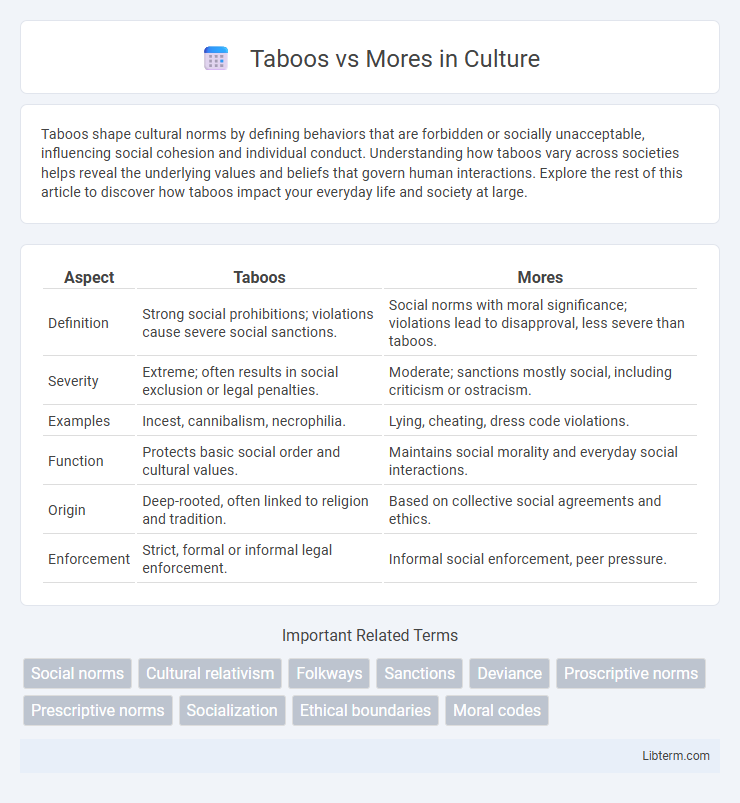Taboos shape cultural norms by defining behaviors that are forbidden or socially unacceptable, influencing social cohesion and individual conduct. Understanding how taboos vary across societies helps reveal the underlying values and beliefs that govern human interactions. Explore the rest of this article to discover how taboos impact your everyday life and society at large.
Table of Comparison
| Aspect | Taboos | Mores |
|---|---|---|
| Definition | Strong social prohibitions; violations cause severe social sanctions. | Social norms with moral significance; violations lead to disapproval, less severe than taboos. |
| Severity | Extreme; often results in social exclusion or legal penalties. | Moderate; sanctions mostly social, including criticism or ostracism. |
| Examples | Incest, cannibalism, necrophilia. | Lying, cheating, dress code violations. |
| Function | Protects basic social order and cultural values. | Maintains social morality and everyday social interactions. |
| Origin | Deep-rooted, often linked to religion and tradition. | Based on collective social agreements and ethics. |
| Enforcement | Strict, formal or informal legal enforcement. | Informal social enforcement, peer pressure. |
Understanding Taboos and Mores
Taboos are deeply ingrained social prohibitions that evoke strong emotional reactions and often lead to severe consequences when violated, reflecting a society's core values. Mores are norms that dictate ethical behavior and social conduct, generally enforced through social sanctions but with less emotional intensity than taboos. Understanding the distinction helps analyze how cultural values shape acceptable behavior and maintain social order.
Defining Taboos: Boundaries of Behavior
Taboos represent the strongest form of social norms, defining prohibitions so deeply ingrained that their violation provokes intense moral outrage and social exclusion. These boundaries of behavior encompass actions considered universally unacceptable within a culture, such as incest or cannibalism, reflecting fundamental values that maintain social order. Unlike mores, which are customs with moral significance subject to change, taboos remain inviolable and serve as critical markers of communal identity and cohesion.
What Are Mores? Social Standards Explained
Mores are social norms that embody the moral views and principles of a community, guiding acceptable and unacceptable behavior to maintain social order. These standards are often strictly enforced because violating mores can lead to severe social disapproval or punishment, reflecting deep cultural values. Unlike taboos, which prohibit extreme or offensive actions, mores regulate everyday conduct essential for societal cohesion.
Key Differences Between Taboos and Mores
Taboos are strict prohibitions rooted in deep cultural or religious beliefs that evoke strong emotional reactions and severe social penalties when violated, such as incest or cannibalism. Mores are social norms governing moral behavior and societal expectations, with violations causing disapproval or sanctions but typically less intense than taboos, like dress codes or etiquette. The key differences lie in the severity of the consequences and the underlying cultural or moral significance attached to each, with taboos representing absolute prohibitions and mores embodying important but flexible social rules.
Cultural Context: How Taboos and Mores Vary Globally
Taboos and mores differ significantly across cultures, reflecting diverse social values and norms that shape acceptable behavior within communities. While mores represent deeply held moral beliefs that guide societal conduct, taboos involve prohibitions so strong that violating them often results in severe social ostracism or punishment. The intensity and specifics of these norms vary globally, influenced by historical, religious, and social contexts that define what is considered sacred or forbidden in each culture.
The Role of Taboos in Shaping Society
Taboos play a crucial role in shaping society by establishing non-negotiable behavioral boundaries that maintain social order and cultural identity. Unlike mores, which are norms that govern everyday conduct and can evolve over time, taboos enforce deeply ingrained prohibitions that evoke strong emotional responses, often linked to morality and collective well-being. These prohibitions contribute to social cohesion by preventing actions considered harmful or offensive, thereby reinforcing stability within communities.
Mores: Reinforcing Social Order and Morality
Mores are deeply ingrained social norms that dictate moral behavior and reinforce societal cohesion by distinguishing right from wrong. These cultural imperatives are essential for maintaining social order, as violations often result in strong social sanctions or legal consequences. By upholding collective values, mores promote stability and ethical standards within a community.
Violating Taboos vs Breaking Mores: Consequences
Violating taboos results in severe social condemnation, often leading to ostracism or legal penalties due to their deep-rooted cultural or moral significance. Breaking mores typically incurs social disapproval or sanctions but is less likely to provoke extreme consequences compared to taboo violations. The distinction lies in the intensity of societal reaction, with taboos reflecting fundamental prohibitions vital to communal cohesion.
Changing Taboos and Mores Over Time
Taboos and mores evolve significantly as societies progress, reflecting shifts in cultural values and social norms. Practices once strictly forbidden, such as interracial marriage and women's roles in the workforce, are now widely accepted or even encouraged in many cultures. This dynamic change illustrates how collective morality adapts to contemporary ethical standards and increased cultural diversity.
Taboos and Mores in Contemporary Society
Taboos represent deeply ingrained social prohibitions often linked to moral or cultural beliefs, such as incest or cannibalism, that provoke strong negative reactions when violated. Mores are social norms that govern ethical behavior, like honesty and respect, and while breaches may lead to social disapproval or sanctions, they are less severe than violating taboos. In contemporary society, taboos maintain boundaries around critical issues like sexual conduct and bodily autonomy, whereas mores evolve more fluidly alongside changing cultural attitudes and legal standards.
Taboos Infographic

 libterm.com
libterm.com